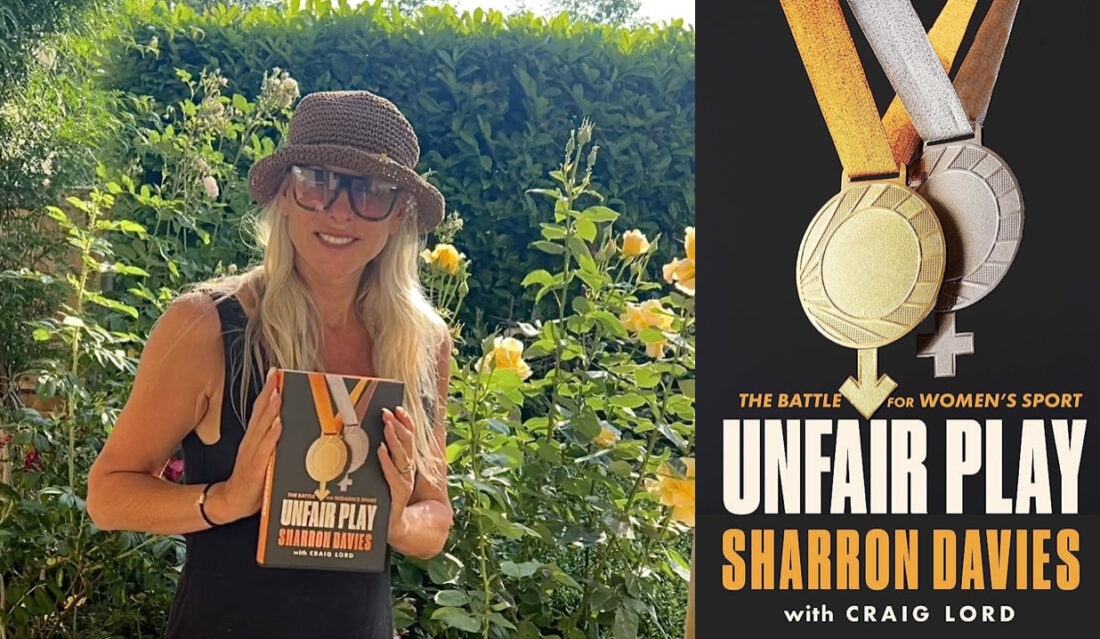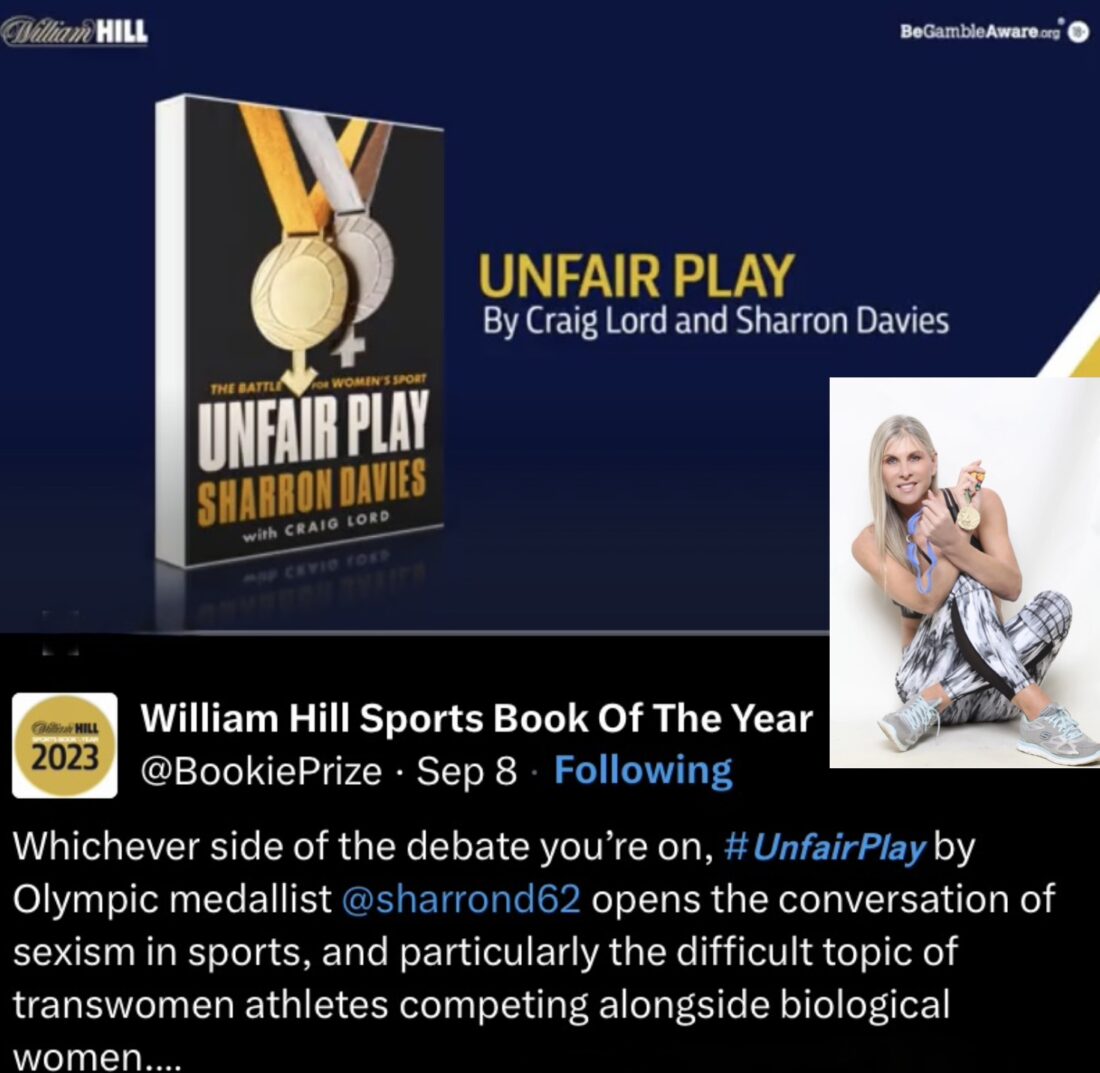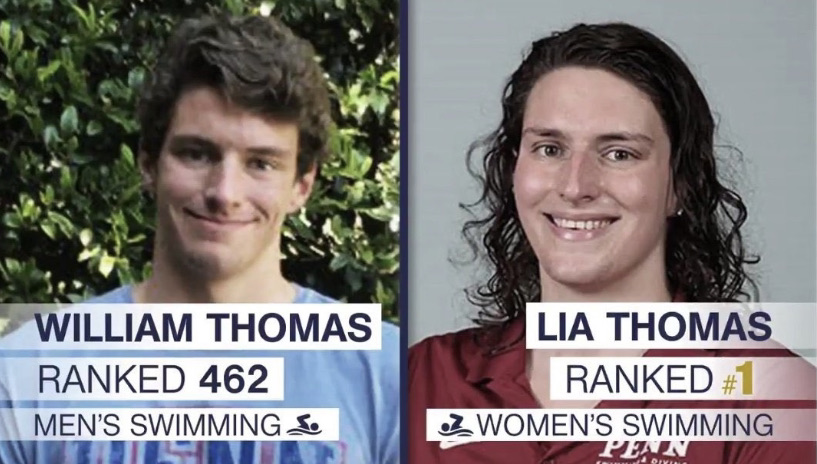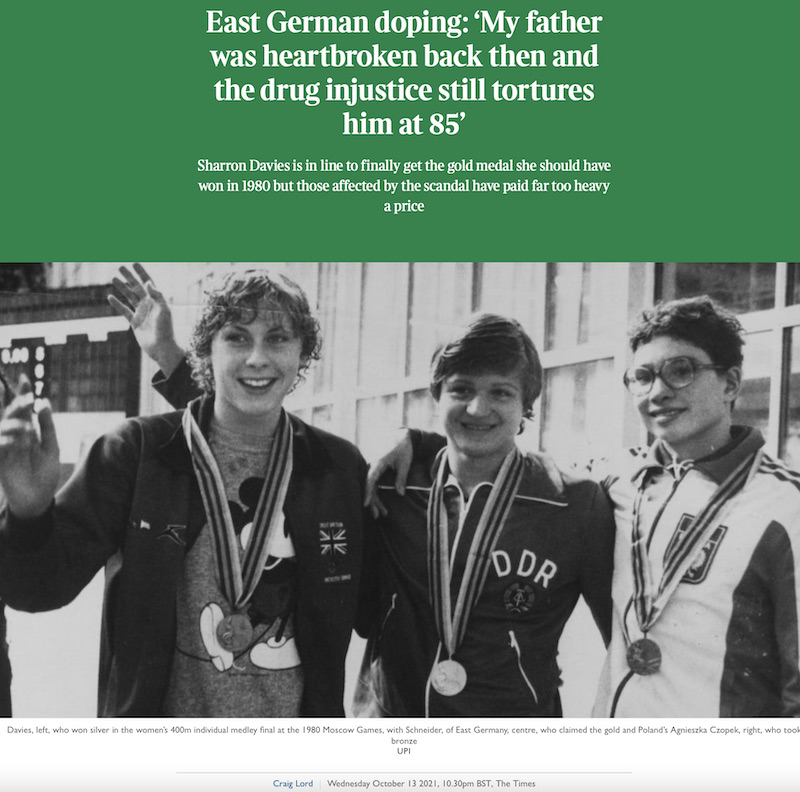Sharron Davies Lifts The SOS Courage Cup On Front Line Of The Women’s Fight To Save Their Sex-Based Spaces & Races

The SOS Courage Cup for 2023 goes to Sharron Davies, the first swimmer unaided by male steroids to stop the clock in the 1980 Olympic 400m medley final and athlete-voice campaigner for truth, justice and reconciliation for female athletes in the face of half a century and more of Unfair Play.
The latter is capped because it is the title of the book Unfair Play in which Sharron charts the appalling experience of women in Olympic (and other) sports since the modern Games got underway in 1896. The latest overt discrimination against women was triggered by the late 2015 decision (it would be at least a year later, beyond the Rio 2016 Olympics, before the consequences became clear) of the International Olympic Committee to remove the only remaining barrier to biological males having access to female sport.
Since that 2015 decision, it’s been open season on women in female sport. The decision was one many could support: that male-genital surgery, including removal of testes, would no longer be a criteria to determine who could access female sport. However, the decision stated that such surgery would no longer be required for male athletes who identify as women to compete with female athletes.
In other words, self-ID was enough, with a few red herrings thrown in, such as testosterone reduction, which does not remove male attributes built in a male child in the womb and then boosted to a hugely significant degree at puberty and highly significant to sports performance. Male advantage is real and cannot be mitigated to anywhere close to “fair play”, as Ross Tucker explains so well.
Then there’s the use of such terms as “meaningful” competition, a part of the misleading lexicon in the latest IOC non-binding guidelines on inclusion at the Olympic Games – 2021 and 2022 update from IOC advisers; guidance which international federations can, and have, in the case of aquatics, track and field and cycling, for example, ignore.
World Athletics Bars Males From Female Category (Restricted Access For DSDs)
World Cycling Joins Aquatics & Athletics: No Ticket To Female Races For Post-Puberty Males
“Meaningful” is blown to smithereens as a credible concept and description by this excellent reasoning from Jon Pike: “Why ‘Meaningful Competition’ is not fair competition”. He describes ‘meaningful competition’ as:

… an attempt at conceptual engineering that should be resisted. This is important because some International Federations have accepted MC as good coin, and the underlying theory of MC, which I explicate for the first time, underpins the stance taken by the IOC (International Olympic Committee) in its Framework Document. To establish that the inclusion of TW in female sport meets the criteria of MC in the sense I explicate here, does not show that the inclusion of TW in female sport is fair. Such inclusion is not fair, and the proper currency of sport is fair competition. ‘Meaningful Competition’, on the other hand, is a snare and a delusion.
Jon Pike – Senior Lecturer in Philosophy. Political Philosophy, and the Ethics and Metaphysics of Sport
I couldn’t agree more. I’m also very happy to declare my interest and bias in the SOS selection for our Courage Cup: I co-authored Unfair Play with Sharron and agree with her campaign to save women’s races and spaces for female athletes in sport and in specific sex-based realms already protected by law but under constant attack from those who want such provisions either watered down or removed altogether.
In calling for Fair Play for women, Sharron has faced death threats and suffered lost opportunities and work in the face of horrid cancel-culture campaigns. While that trend is alive and kicking in certain places, fear coercion and a lack of courage in the mix, the tide has most certainly turned.
Since completing Unfair Play, the number of sports now ring-fencing the women’s categories from anyone who has experienced male puberty, regardless of how they identify, has gone from less than a handful into double digits, with several Olympic federations committed to join the commitment to Fair Play for women ahead of cyclical votes at various Congresses to come. Sharron can be proud of the ole she has played in driving that progress (along with others, including those listed below).
Long may that trend continue. Sadly, as Paris 2024 approaches, the IOC has not picked up on the trend and this week confirmed to this writer that it is standing by its 2021/2022 framework, with its discriminatory approach to fair play and women. The IOC mentions “disproportionate advantage” but fails to define what that looks like, while avoiding mentioning what requires no definition because it’s overtly real and visible in every Olympic result there ever was in sports such as swimming and track and field: male advantage.

The suggestion that male advantage can be mitigated by testosterone reduction fails the smell test: the question is not “mitigation” but “mitigation to the point of fair play”. In the case of Lia Thomas in swimming and many others in a variety of sports, it was very obvious that mediocre biological males were allowed to make a radical, undeniably huge, change to their status in sport on transition from male to identifying as a trans woman.
Shifting from outside the best 2500 in middle-distance freestyle men and outside the top 4,000 among sprint freestyle men in the world to a pace worthy of a World top 10/20 (and even 30 in sprint) place among women adds up to this: Unfair Play and overt discrimination against female athletes.
Sport, in a wide range of disciplines, is sex-based and always has been for very obvious and sound reasons. That argument is reinforced by the GDR doping era, in which scientists in East Germany answered their communist government’s call to produce winning “ambassadors in tracksuits” with a plan to androgenise young girls with male steroids around the age of puberty.

A little of what boys get from nature was enough to make a massive difference – and female athletes on all sides were the victims. The East German women got the medals (and how – see Unfair Play for the devastating detail and counts) and paid a price in poor health, their own problems sometimes extending to those inherited from the GDR propaganda machine by their disabled children.
The head of that GDR machine, Erich Honecker, was a signatory to the state secret doping program and yet he remains the recipient of the IOC, Olympic Order, gold, prize for “services to sport”. The book of Olympic results at three or four (depending on which sports you consider) the 1970s and 1980s is a fat tome of lies, approved by the very guardians themselves: the IOC has left the biggest heist in world sport untouched, unexamined, un-investigated.
The ghosts of that era live on in the lives of the survivors of an age when Games bosses failed generations of athletes, their parents, coaches and communities. Clean sport was kicked to the curb with the other female victims: the women beaten to a pulp by systematic cheating.
That links to our first award in the SOS 2023 series: the Carlile Cup for Lifetime Achievement, to Brigitte Berendonk and Werner Franke.
As noted by Sharron and others who would have celebrated Olympic gold had it not been for East Germany’s state deceit, it’s not just about their gold medals. Far from it. It’s about the lost silver, the lost bronze, the lost medal of any collier, in many cases, the first clean swimmer home locked out of the medals altogether. It’s also about the missed finals, the missed selections (qualification standards were often set by nations on the basis of world records and standards enhanced and being achieved many years, in some instances decades, ahead of their time) , the lost opportunities throughout life.
The IOC knows it: the reason it grants Olympians the right to use OLY after their names, regardless of standard in a wide spectrum at an event that is more about participation and universal representation that elite, podium-shot sport, is because it believes just being at the Games, let alone achieving anything, is highly prestigious and likely to convey respect and certain advantage in life for those able to harness themselves to the Movement.

That was not the case for waves of female athletes denied, including cases in which the nature and magnitude of the lost opportunity make the well of tears run to tragic depths. take Enith Brigitha: the talented Dutch sprinter might have been the first black Olympic swimming champion back in 1976.
The first to claim that accolade was Simone Manuel in 2016. That’s 40 years in which the inspiration and national policies that can flow from Olympic gold and similar success was put on ice. In the meantime, the drowning statistics in the black community – including woeful figures in the United States, long the world’s number 1 swim nation – were abominable.
Nancy Garapick. Do you know here name? She should have been a household name in Canada as a double backstroke Olympic champion at a home Games in Montreal back in 1976. She would have been a part of the most decorated Canadian women’s swim team in history. It was not to be … because of cheating that was never called to account, never used to send the right message as the most blatant example of political manipulation and harm of young athletes, on both sides of the Cold War in sport.
Sharron lived through was impacted by and endured that era. In 2023, she highlighted those issues and many others from her competitive era and the past 30 years since she swam at the last of her three Olympic Games. Sharron’s 1992 selection for Britain was a comeback success story after she had spent much of the 1980s after the Moscow Games barred from sport under “amateurism” rule 26 of the then Olympic Charter.
She’d accepted a £40 fee to cover her expenses when appearing on a TV quiz show that had nothing to do with sport. All the while she was barred, Soviet bloc athletes, who had their training and living costs subsidised, were given financial rewards for medals along with bonuses for success that stretched to apartments and cars. So much for universal rules and competition conditions.
Having known Sharron throughout all the years of her swimming career and since in her capacity as an expert on the BBC team conducting interviews at the Olympic Games, World Championships and others events, it was a pleasure and a privilege to help her put Unfair Play on the page.
As The Times, the paper I’ve worked for 35 years, put it, the work is “thrillingly fearless”. I had no doubt it would be from the moment Sharron called me and I gave her an instant “yes!” She is what the athlete voice must be if it is to be genuine and uncompromising, independent from the organisations such voice must hold to account is it is to be credible.
Her courage has been at the forefront of a movement (of women and supportive men) to save women’s sport. It would be impossible to name every one of those who have lent their voices to the campaign for truth and fair play (the justice and reconciliation side of a coin waiting to be flipped) in the struggle, nay cultural war, to save women’s sport. As such …
Perseverance Palms For Dedication To Truth & Fair Play
Here are a few of those SOS grants a Perseverance Palm to as a modest token of recognition for their efforts in the face of hate and opprobrium from the very quarter that accuses them of being hateful when all they are asking for is recognition that sex matters in sport and inclusion is pointless if it delivers unfair and unsafe play in the way the inclusion of biological males in female sport most certainly does.
The following names, individuals and organisations, are among the leaders of the women’s groups campaigning for their rights, spaces and races to be preserved as intended in Equality law. The Perseverance Palms got to them and the very many more who stand by them:
- Champion Women (advocacy by Nancy Hogshead-Makar and team)
- Fair Play for Women
- Independent Council on Women’s Sports (ICONS, including the work of Kim Shasby Jones)
- International Consortium on Female Sport (ICFS)
- Save Women’s Sports
- Save Women’s Sport Australasia
- Sex Matters (including resources for parents and Including the work of Co-founder and Executive Director (and pioneer winner of an important legal test case) Maya Forstater, Co-founder and Executive Director Helen Joyce, Director of Advocacy Beck Laxton, the rest of the board with Maya – Naomi Cunningham, Chair of the Board Julia Casimo, Treasurer, and directors Rebecca Bull, Dr Emma Hilton, Dr Michael Biggs.)
- Sporting Integrity (founded by Michele Verroken)
And … BoysVsWomen – an invaluable and excellent resource from Jake Teater, who pinpoints the truth on male advantage,
In the midst of the madness, all those on this list have faced waves of nonsense from both organisations and individuals plugging ideology.
Martina Navratilova, the tennis ace, this week highlighted the following example, exposed in an Open Letter to the National Women’s Law Center from the Women’s Sports Policy Working Group.
Also among the leading voices who have made consistent contributions to truth and Fair Play: Kathleen Stock, J. K. Rowling, Daley Thompson, Mara Yamauchi, Alyson Sydor, Inga Thompson, Riley Gaines, Paula Scanlan, Paul Griffin, Jennifer Gingrich, KS-Canada0, Dr Julia Shannahan, Prof. Alice Sullivan, RunnersWeb, Rebecca Reza, Joe Papp, Orion Coaching, Victoria Hood and George M. Perry.
Thanks also to those who supported all efforts to get Unfair Play published:
The Team at Swift Press, with managing director Diana Broccardo and publisher Mark Richards, and Forum Press and our editor on the project George Owers. Literary agent Caroline Hardman of Hardman & Swainson and publicist Ruth Killick.
And some resources where you can find wisdom and facts:
Dr. Carol Hooven – Testosterone
Dr. Linda Blade and Barbara Kay – Unsporting
The Real Science of Sport Podcast (with Professor Ross Tucker and Mike Finch)
Cathy Devine: ‘Written evidence submitted by Cathy Devine [GRA1160]’, to UK Parliament committees.
Emma N. Hilton and Tommy R. Lundberg, ‘Transgender women in the female category of sport: perspectives on testosterone suppression and performance advantage’, Sports Medicine 51 (2020), pp. 199–214.
Jon Pike, ‘Safety, fairness, and inclusion: transgender athletes and the essence of rugby’, Journal of the Philosophy of Sport 48/2 (2021), pp. 155–68,
Jon Pike, ‘Why “meaningful competition” is not fair competition’, Journal of the Philosophy of Sport 50 (2023), pp. 1–17,
Miroslav Imbrišević, ‘The transgender reader: language, law, sport and reality. A collection of essays, new edition (extended)’ [PDF published by Brighteye Publishing, Worthing, Sussex, 2023]
Timothy A. Roberts, Joshua Smalley and Dale Ahrendt, ‘Effect of gender-affirming hormones on athletic performance in transwomen and transmen: implications for sporting organisations and legislators’, British Journal of Sports Medicine 55/11 (2021), pp. 577–83.
Anna Wiik, Tommy R. Lundberg et al., ‘Muscle strength, size, and compo- sition following 12 months of gender-affirming treatment in transgender individuals’, Journal of Clinical Endocrinology and Metabolism 105/3 (March 2020), pp. e805–e813.
So far in the SOS 2023 Awards:
SOS 2023 Awards: The Carlisle Cup – Lifetime Achievement To Berendonk & Franke
Marchand, O’Callaghan & McKeown: SOS Swimmers Of The Year For 2023
Excellent, Craig. Thanks for lifting up Sharron Davies and all these other women and male allies. Saving women’s sports is such important work – and it’s helpful to take time to celebrate these tireless advocates. Kudos to you, Sharron, and all.
Thank you Mariah, much appreciated.